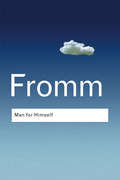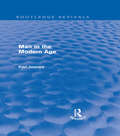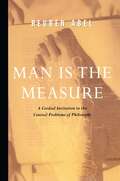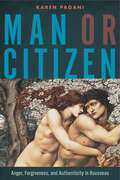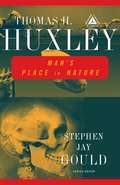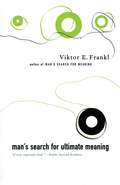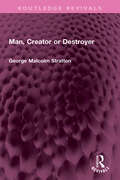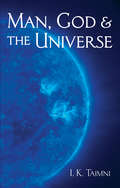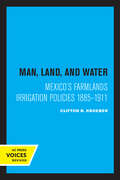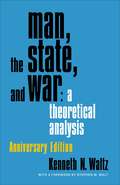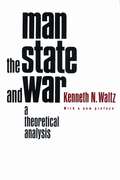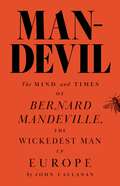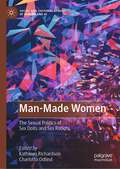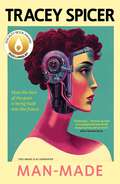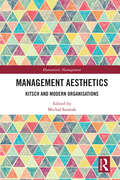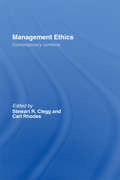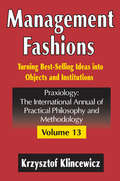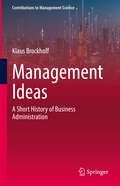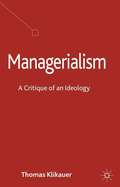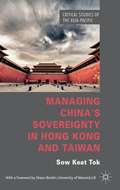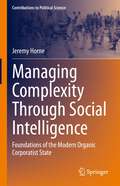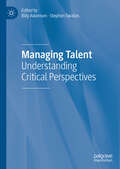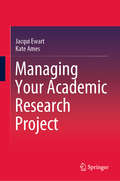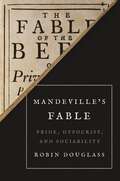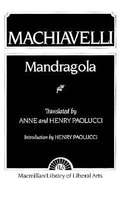- Table View
- List View
Man for Himself: An Inquiry into the Psychology of Ethics (Routledge Classics)
by Erich FrommErich Fromm fought long and hard for the rights and freedoms of the individual. He also recognized that fundamental to this pursuit is the promotion of self-knowledge. In encouraging people to analyze their own behavior, Fromm identified the crucial link between psychology and ethics that underpins all our actions. Moreover, he saw in this a way out of the meaningless impasse which he regarded as the plight of the modern human race. The task that Fromm sets himself, therefore, in Man for Himself is no less than to identify "what man is, how he ought to live, and how the tremendous energies within man can be released and used productively." The resulting book is ample witness to Fromm's success. It makes for exciting, illuminating, even life-changing reading.
Man in the Modern Age (Routledge Revivals)
by Karl JaspersFirst published in English in 1933, this detailed philosophical examination of the contemporary state and nature of mankind is a seminal work by influential German philosopher Karl Jaspers. Elucidating his theories on a variety of topics pertaining to contemporary and future human existence, Man in the Modern Age is an ambitious and wide-ranging work, which meditates upon such diverse subjects as the tension between mass-order and individual human life, our present conception of human life and the potential for mankind's future existence. Written shortly before the accession to power of Hitler and National Socialism, this is not only an important philosophical work, but also an insightful and intriguing historical document.
Man is the Measure
by Reuben AbelAn accessible introduction to philosophy, this book narrows the gap between the general reader and intellectual inquiry. Its points are illustrated with concrete examples which should call the reader to a higher level of critical thinking and self-perception.
Man or Citizen: Anger, Forgiveness, and Authenticity in Rousseau (G - Reference, Information and Interdisciplinary Subjects)
by Karen PaganiThe French studies scholar Patrick Coleman made the important observation that over the course of the eighteenth century, the social meanings of anger became increasingly democratized. The work of Jean-Jacques Rousseau is an outstanding example of this change. In Man or Citizen, Karen Pagani expands, in original and fascinating ways, the study of anger in Rousseau’s autobiographical, literary, and philosophical works. Pagani is especially interested in how and to what degree anger—and various reconciliatory responses to anger, such as forgiveness—functions as a defining aspect of one’s identity, both as a private individual and as a public citizen. Rousseau himself was, as Pagani puts it, “unabashed” in his own anger and indignation—toward society on one hand (corrupter of our naturally good and authentic selves) and, on the other, toward certain individuals who had somehow wronged him (his famous philosophical disputes with Voltaire and Diderot, for example). In Rousseau’s work, Pagani finds that the extent to which an individual processes, expresses, and eventually resolves or satisfies anger is very much of moral and political concern. She argues that for Rousseau, anger is not only inevitable but also indispensable, and that the incapacity to experience it renders one amoral, while the ability to experience it is a key element of good citizenship.
Man's Place in Nature: And Other Anthropological Essays (classic Reprint) (Modern Library Science)
by Thomas Henry Huxley Stephen Jay GouldThomas Henry Huxley was one of the first supporters of Charles Darwin's theory of evolution by natural selection, and he did more than any other writer to advance its acceptance among scientists and nonscientists alike. His most famous book, Man's Place in Nature, published only five years after Darwin's The Origin of Species, offers a compelling review of primate and human paleontology, and is the first attempt to apply Darwin's theory to human beings. As compelling a piece of analysis now as it was 140 years ago, Man's Place in Nature is a must for every science lover's library.
Man's Search For Ultimate Meaning
by Viktor E FranklViktor Frankl, bestselling author of Man's Search for Meaning, explains the psychological tools that enabled him to survive the HolocaustViktor Frankl is known to millions as the author of Man's Search for Meaning, his harrowing Holocaust memoir. In this book, he goes more deeply into the ways of thinking that enabled him to survive imprisonment in a concentration camp and to find meaning in life in spite of all the odds. He expands upon his groundbreaking ideas and searches for answers about life, death, faith and suffering. Believing that there is much more to our existence than meets the eye, he says: 'No one will be able to make us believe that man is a sublimated animal once we can show that within him there is a repressed angel.'In Man's Search for Ultimate Meaning, Frankl explores our sometimes unconscious desire for inspiration or revelation. He explains how we can create meaning for ourselves and, ultimately, he reveals how life has more to offer us than we could ever imagine.
Man, Creator or Destroyer (Routledge Revivals)
by George Malcolm StrattonFirst published in 1952, Man, Creator or Destroyer makes clear that mankind is preeminent both as a creator and as a destroyer. And we are doomed unless creative man can master destructive man. But how gain this mystery? How strengthen the one and weaken the other? This and other vital questions are answered clearly for the general reader interested in creative work, from art and science to crime-prevention and international statecraft. The first part is concerned with man’s creative power which distinguishes him from all else on earth and suggests that man is much more than a machine or an animal. In the second part attention moves to man’s destructive power and studies his inclination to obstruct and shatter his own constructive work. The book concludes with an examination of the ways in which the creative power can gain the mastery.
Man, God, and the Universe
by I K TaimniThe nature of creation and a synthesis of Eastern and Western thought.
Man, Land, and Water: Mexico's Farmlands Irrigation Policies 1885-1911
by Clifton KroeberThis title is part of UC Press's Voices Revived program, which commemorates University of California Press’s mission to seek out and cultivate the brightest minds and give them voice, reach, and impact. Drawing on a backlist dating to 1893, Voices Revived makes high-quality, peer-reviewed scholarship accessible once again using print-on-demand technology. This title was originally published in 1983.
Man, the State, and War: A Theoretical Analysis
by Kenneth WaltzWhat are the causes of war? How might the world be made more peaceful? In this landmark work of international relations theory, first published in 1959, the eminent realist scholar Kenneth N. Waltz offers a foundational analysis of the nature of conflict between states. He explores works by both classic political philosophers, such as St. Augustine, Hobbes, Kant, and Rousseau, and modern psychologists and anthropologists to discover ideas intended to explain war among states and related prescriptions for peace. Waltz influentially distinguishes among three “images” of the origins of war: those that blame individual leaders or human nature, those rooted in states’ internal composition, and those concerning the structure of the international system. With a foreword by Stephen M. Walt on the legacy and continued relevance of Waltz’s work, this anniversary edition brings new life to a perennial international relations classic.
Man, the State, and War: A Theoretical Analysis
by Kenneth WaltzWhat are the causes of war? To answer this question, Professor Waltz examines the ideas of major thinkers throughout the history of Western civilization. He explores works both by classic political philosophers, such as St. Augustine, Hobbes, Kant, and Rousseau, and by modern psychologists and anthropologists to discover ideas intended to explain war among states and related prescriptions for peace.
Man-Devil: The Mind and Times of Bernard Mandeville, the Wickedest Man in Europe
by John J. CallananA lively and provocative account of Bernard Mandeville and the work that scandalized and appalled his contemporaries—and made him one of the most influential thinkers of the eighteenth centuryIn 1714, doctor, philosopher and writer Bernard Mandeville published The Fable of the Bees, a humorous tale in which a prosperous hive full of greedy and licentious bees trade their vices for virtues and immediately fall into economic and societal collapse. Outrage among the reading public followed; philosophers took up their pens to refute what they saw as the fable&’s central assertion. How could it be that an immoral community thrived but the introduction of morality caused it to crash and burn? In Man-Devil, John Callanan examines Mandeville and his famous fable, showing how its contentious claim—that vice was essential to the economic flourishing of any society—formed part of Mandeville&’s overall theory of human nature. Mandeville, Callanan argues, was perfectly suited to analyze and satirize the emerging phenomenon of modern society—and reveal the gap between its self-image and its reality.Callanan shows that Mandeville&’s thinking was informed by his medical training and his innovative approach to the treatment of illness with both physiological and psychological components. Through incisive and controversial analyses of sexual mores, gender inequality, economic structures, and political ideology, Mandeville sought to provide a naturalistic account of human behavior—one that put humans in close continuity with animals. Aware that his fellow human beings might find this offensive, he cloaked his theories in fables, poems, anecdotes, and humorous stories. Mandeville mastered irony precisely for the purpose of making us aware of uncomfortable aspects of our deepest natures—aspects that we still struggle to acknowledge today.
Man-Made Women: The Sexual Politics of Sex Dolls and Sex Robots (Social and Cultural Studies of Robots and AI)
by Kathleen Richardson Charlotta OdlindThis book presents a unique, feminist approach to ‘sex’ dolls and ‘sex’ robots, taking a critical look at the academic and business narratives that serve to rationalise them. As new forms of pornography (porn robots), this edited volume provides an urgent women’s centred critique. The emergence of ‘sex’ robots is situated within the wider context of the attack on women’s rights and the relentless rise of techno-pornography. As an outgrowth of the industries of prostitution, pornography and child sex abuse, these objects offer new ways to dehumanise women and girls. While support for ‘sex’ robots is positioned as progressive and emancipatory, the contributors in this volume argue they reduce women to consumable parts. They explore how law, the arts, ethics, economy, politics and culture are interconnected with harmful technological developments.
Man-Made: How the bias of the past is being built into the future
by Tracey SpicerWalkley Award-winning journalist Tracey Spicer exposes the next frontier of feminism. Man-Made aims to open readers&’ eyes to a transformative technological shift in society and give them the tools to make positive change. `Mum, I want a robot slave.&’ Broadcaster Tracey Spicer had an epiphany when her young son uttered these six words. Suddenly, her life&’s work fighting inequality seemed futile. What&’s the point in agitating to change the present, if bigotry is being embedded into our futures? And so began a quest to uncover who was responsible and hold them to account. Who is the ultimate villain? Big Tech, whose titans refuse to spend money to fix the problem? The world&’s politicians, who lack the will to legislate? Or should we all be walking into a hall of mirrors and taking a good, hard look at ourselves…? This is a deeply researched, illuminating and gripping ride into an uncertain future, culminating in a resounding call to action that will shake the tech sector to its foundations.Praise for Man-Made &‘Exhilarating … The book we need as we grapple with how AI will change our lives and our world.&’ Dame Quentin Bryce &‘Brilliant, hilarious and terrifying. You&’ll never see Alexa the same way again.&’ Juanita Phillips &‘Tracey Spicer uses her unmistakably human voice to warn us all about the deeply sexist Frankenstein&’s Monster that is modern AI.&’ Yumi Stynes
Management Aesthetics: Kitsch and Modern Organisations (Humanistic Management)
by Michał SzostakThis edited collection presents the complex theory of kitsch from aesthetic and artistic points of view, transposed into managerial and organisational fields. In the spirit of management aesthetics, on the ground of humanistic management, the central aim of the volume is to show that kitsch is a common phenomenon not only in art and culture but also in management, and its conscious perception and mindful use may be beneficial for achieving organisational and managerial goals efficiently. Due to the diverse research problems covered by particular chapters, no unified methodology is applied in the book; every author applied an optimal method for the selected topic. However, due to the complex and metaphysical character of the kitsch phenomenon, the only common fundament of all chapters is using the kitsch experience theory (Szostak and Sułkowski, 2020). The dominant analytical approach is qualitative, with extensive use of case studies, comparative analyses, and ethnographic focus. Despite this, some chapters also include the application of the quantitative approach for the hypotheses’ verification. This book makes a giant step ahead of its competitors by implementing the kitsch theory, especially the kitsch experience theory in a broad spectrum of managerial and organisational fields like marketing, advertising, brand management, business communication, entrepreneurship, leadership, decision-making, human resource management, corporate social responsibility, city space management, management of technology and innovation, and organisational culture. It should be a must-read for researchers, academics, practitioners, and advanced students in these fields.
Management Ethics: Contemporary Contexts (Routledge Companions In Business, Management And Accounting Ser.)
by Stewart R. Clegg Carl RhodesEthics has become big business but have businesses become ethical? This is a central question for today’s managers. Managing ethics is critical in an era characterized by unprecedented corporate power and a myriad of competing ethical traditions. Giving new insights into the understanding of ethics for today’s organization practice and managerial behaviour, this timely volume, edited by well-respected industry authorities, provides an overview and critique of ethics as they relate to contemporary challenges and issues (such as globalization, sustainability, consumerism, neo-liberalism, corporate collapses, leadership and corporate regulation). This book, an essential read for postgraduate students of business and ethics, is organized around the core question: What are the ethics of organizing in today’s institutional environment and what does this mean for the practice of management and the organization of business? In response to this, the contributors examine ethics as it is deeply embedded in the everyday practice of management. Interdisciplinary contributions from the fields of sociology, philosophy, management, organization studies and public administration provide unique perspectives, while case studies and real-life examples illustrate the challenges and dilemmas faced in practice. Each chapter has a brief overview and editor’s introduction which skilfully summarizes key points and draws connections between the chapters.
Management Fashions: Turning Bestselling Ideas into Objects and Institutions (Praxiology: The International Annual Of Practical Philosophy And Methodology Ser.)
by Krzysztof KlincewiczUsing the theory of management fashions proposed in the 1990s by Eric Abrahamson, Krzysztof Klincewicz analyzes the changing popularity of management concepts accompanied by solutions. Among these are management bestsellers, consulting services, software systems, methodologies, and approaches to organizational change, training courses, professional certifications and even new corporate positions.The book presents the phenomena of management fashions as being the key driver for the development of the management knowledge industry, consisting of consulting companies, computer firms, publishing houses, professional institutes, and other organizations involved in the launching and the promotion of new management techniques. The author supplements the existing body of knowledge by focusing on the supply-side of management fashions, particularly the strategies and marketing techniques of solution vendors, and proposes a model of relations between management ideas and tangible solutions, explaining how bestselling ideas are turned into objects and institutions.The empirical research described in this volume involves multiple methods, including discourse volume analysis and qualitative historical techniques. Included also is a comprehensive overview of the recent relevant developments in sociology, marketing, and organization sciences, in which the author draws on the heritage of praxiology by taking a meta-level perspective on the propositions of management science.
Management Ideas: A Short History of Business Administration (Contributions to Management Science)
by Klaus BrockhoffThis book offers a short history of business administration in four parts. Part 1 takes the reader from 8000 BCE with the development of simple control techniques to the middle of the nineteenth century. At this time, normative, empirical, and theoretical approaches to business problems in the industrial area were developed. Furthermore, more powerful methodologies came into use. In Part 2, the criteria for science are discussed and related to the development of business administration as a science at the beginning of the twentieth century. Part 3 demonstrates, using Germany as an example, the development of business administration as strongly influenced by its societal environment. The cases of National Socialist Germany, the socialist environment of the German Democratic Republic, and the reconstruction of an academic-inspired business administration in Western Germany are provided as illustrative examples. Part 3 also presents a typology of major specializations in business administration, examples of their development, and a proposal for a curricular approach to the discipline. The fourth and final part presents the benefits of studying the history of management ideas. This book is useful for academics in business administration, advanced students, and anyone who seeks to understand recent developments in business administration.
Managerialism
by Thomas KlikauerMost people know what management is but often people have vague ideas about Manageralism. This book introduces Manageralism and its ideology as a colonising project that has infiltrated nearly every eventuality of human society.
Managing China's Sovereignty in Hong Kong and Taiwan
by Sow Keat TokIs China always defensive about its sovereignty issues? Does China see sovereignty essentially as 'absolute,' 'Victorian,' or 'Westphalian?' Sow Keat Tok suggests that Beijing has a more nuanced and flexible policy towards 'sovereignty' than previously assumed. By comparing China's changing policy towards Taiwan and Hong Kong, the author relates the role of previous conceptions of the world order in China's conception of modern 'sovereignty', thereby uncovers Beijing's deepest concern when dealing with its sovereignty issues.
Managing Complexity Through Social Intelligence: Foundations of the Modern Organic Corporatist State (Contributions to Political Science)
by Jeremy HorneThis book presents solutions to problems that are total and based on thinking about how and why humans have organized themselves. It discusses how to avoid the now well-documented Holocene Extinction, propelled by climate change, wars, resource depletion, desertification, degrading knowledge quality, famine, and deterioration of societies overall. It explains why we cannot respond effectively with hedonistic, incompetent, corrupt, and anarchistic "liberal democracy" and why neither personality cult regimes can suffice. The book offers a model of an organic social structure embodying a collective consciousness of communitarianism and Platonic-style ethos. Putting an emphasis on the re-establishment of Classical Greek virtue, it offers solutions to resolve identity politics, alienation, and meritocracy. While doing so, the author opposes the "everyone is equal" ideology to govern the section of policymakers, instead circumscribing "rights" in terms of responsibilities, prioritizing education and training to carry forth the ethos of valuing truth above materialism, and developing Durkheim's social brain via a new discipline, "sociointelligence". The book goes on to explain how underpinning these elements is a comprehensive elucidation of often misunderstood words like "liberty", "freedom", "authoritarianism", and "democracy". All of these areas are arranged and combined in uniquely describing the organic society the author deems necessary to avoid human extinction. As a result, the book presents a “new organicity”, where the emerging transhumanism seeks to transcend hydrocarbon-based life with humanly-constructed life.This book will appeal to students, researchers, and scholars of political science, philosophy, and the social sciences interested in a better understanding of complexity, democratic theory, Holocene Extinction, organic thinking, and meritocratic societies.
Managing Talent: Understanding Critical Perspectives
by Billy Adamsen Stephen SwailesThis edited collection offers a critical appreciation of talent management in contrast to the extensive literature adopting mainstream approaches to the topic. The authors explore fundamental questions in the field to better understand why managing talent seems so attractive as a management practice, the meaning of talent, and how talent is recognised in organisations. The mix of conceptual and empirical chapters in the book teases out some critical perspectives that will provoke thought and reflection among practitioners and stimulate ideas for new research topics and approaches. The diverse contributions presented in this book will undoubtedly be of use to academics, practitioners and postgraduate students of human resource management.
Managing Your Academic Research Project
by Jacqui Ewart Kate AmesThis book is an essential resource for academics managing a large and complex research project. It provides important practical insights into the processes that inform such research projects and delivers insights into the delicate balance between industry, stakeholder and academic needs. It gives practical advice about developing relationships with diverse partners and colleagues and managing the expectations of the various parties involved and on avoiding pitfalls. This book uses examples from Australian research projects, but it contains insights relevant to researchers all around the world.
Mandeville’s Fable: Pride, Hypocrisy, and Sociability
by Dr Robin DouglassWhy we should take Bernard Mandeville seriously as a philosopherBernard Mandeville&’s The Fable of the Bees outraged its eighteenth-century audience by proclaiming that private vices lead to public prosperity. Today the work is best known as an early iteration of laissez-faire capitalism. In this book, Robin Douglass looks beyond the notoriety of Mandeville&’s great work to reclaim its status as one of the most incisive philosophical studies of human nature and the origin of society in the Enlightenment era. Focusing on Mandeville&’s moral, social, and political ideas, Douglass offers a revelatory account of why we should take Mandeville seriously as a philosopher.Douglass expertly reconstructs Mandeville&’s theory of how self-centred individuals, who care for their reputation and social standing above all else, could live peacefully together in large societies. Pride and shame are the principal motives of human behaviour, on this account, with a large dose of hypocrisy and self-deception lying behind our moral practices. In his analysis, Douglass attends closely to the changes between different editions of the Fable; considers Mandeville&’s arguments in light of objections and rival accounts from other eighteenth-century philosophers, including Shaftesbury, Hume, and Smith; and draws on more recent findings from social psychology.With this detailed and original reassessment of Mandeville&’s philosophy, Douglass shows how The Fable of the Bees—by shining a light on the dark side of human nature—has the power to unsettle readers even today.
Mandragola
by Niccolo Machiavelli Anne Paolucci Henry PaolucciWritten somewhere between 1512 and 1520, this is a comedic play in which a love stuck young man tries to win the affections of the young, beautiful wife of an old doctor.
